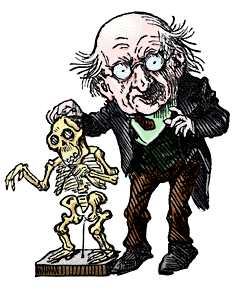LECŢIA 12 - CONDIŢIONALUL
A.
The conditional is used in Romanian in 3 main types of contexts:
Conditional sentences.
Expressing wishes.
Very polite requests.
This is actually not very different from English. Compare the following sentences:
English |
Româneşte |
a. I would buy a car if I had the money. She would have come if she had known.
b. Aş vrea sǎ am o maşinǎ.
c. What would you like to eat? |
Aş cumpǎra o maşinǎ dacǎ aş avea bani. Ar fi venit dacǎ ar fi ştiut.
I would like to have a car.
Ce aţi dori sǎ mâncaţi? |

Group a is made up of so-called conditionals proper, namely types 2 and 3. Type 2 corresponds to conditional present, while type 3 corresponds to conditional past. Here is more clearly outlined the structure of these 2 verb forms:
Conditional |
English |
Examples |
Româneşte |
Exemple |
|
Present |
Would + infinitive |
I would go You would go He would go We would go You would go They would go
|
Aş Ai Ar Am Aţi Ar |
+ infinitiv |
Aş merge Ai merge Ar merge Am merge Aţi merge Ar merge |
Past |
Would + have + participle |
I would have gone You would have gone He would have gone We would have gone You would have gone They would have gone |
Aş Ai Ar Am Aţi Ar |
+ fi + participiu |
Aş fi mers Ai fi mers Ar fi mers Am fi mers Aţi fi mers Ar fi mers |
These verbal structures do not indicate real actions, but only hypothetical ones. This is what “conditional” actually means.
The meaning of conditional past is often times rendered in speaking as well as writing by the verbal form known as the “imperfect”, investigated by us in the lesson on past times. Normally, the “imperfect” indicates a real action, that used to happen or was happening at a certain point in the past. However, we can also use this verb form to refer to a hypothetical action that could have taken place in the past. Here is a - we hope - clear delimitation between the two types of action: real and hypothetical, expressed by means of more or less the same verb tenses
REAL ACTION
|
HYPOTHETICAL ACTION |
|||
Româneşte cu imperfect |
English |
Româneşte cu imperfect |
Româneşte cu conditional trecut |
English |
Mergeam în fiecare duminicǎ la bisericǎ.
Mergeam acasǎ când l-am vǎzut pe Mihai.
|
I used to go to church every Sunday.
I was going home when I saw Mihai.
|
Mergeam cu tine dacǎ aveam timp.
Mergeam la cumpǎrǎturi dacǎ aveam bani.
|
Aş fi mers cu tine dacǎ aş fi avut timp.
Aş fi mers la cumpǎrǎturi dacǎ aş fi avut bani. |
I would have gone with you if I had had time.
I would have gone shopping if I had had the money.
|
Another past conditional verbal structure is “sǎ + fi + participiu”. This structure includes in its meaning the word “dacǎ”. For example, if we were to rephrase the sentence “Dacǎ aş fi avut timp”, we could very well say “Sǎ fi avut timp”, meaning “if I had had time”.


If only we had waited with the baby…
The situation described by the 2 pictures and the caption above can be expressed in the following ways:
Dacǎ am fi aşteptat cu copilul, ar fi fost mai bine.
Dacǎ aşteptam cu copilul, era mai bine.
Sǎ fi aşteptat cu copilul, era mai bine.
Sǎ fi aşteptat cu copilul, ar fi fost mai bine.
Colloquially, but not only, “dacǎ” is often replaced by “de” especially when regrets are expressed.
“De” is normally a preposition used with nouns and pronouns in the Accusative case. However, it can also be used in both present and past conditional contexts, as you can see in the following examples:

Dacǎ n-ar fi aşa de mândrǎ, n-ar mai fi aşa de singurǎ.

synonymous with:
De n-ar fi aşa de mândrǎ, n-ar fi aşa de singurǎ.
meaning:
If she weren't so proud, she wouldn't be so lonely.
OR
Dacǎ ar fi stat acasǎ, n-ar fi avut accidentul.
synonymous with:
De-ar fi stat acasa, n-ar fi avut accidentul.
meaning:
If he had stayed at home, he wouldn't have had the accident.
B.
1. Potriviţi A cu B pentru a obţine propoziţii corecte:
A |
B |
|
|
1 |
|
|
|
|
|
|
|
|
|
J |
|
|
|
|
|
|
|
|
|
2. Traduceţi urmǎtorul text în limba englezǎ:
Dacǎ nu eram român, mi-ar fi plǎcut sǎ fiu extraterestru. Aş fi locuit singur pe
o planetǎ micǎ şi verde şi m-aş fi hrǎnit cu pastile mici şi verzi. Aş fi locuit
într-o capsulǎ rotundǎ şi verde din sticlǎ.
Dacǎ n-aş fi om, cred cǎ mi-ar plǎcea sǎ fiu brad. Aş fi mereu verde şi puternic.
Dacǎ n-aş avea vise atât de trǎznite, cred cǎ m-aş plictisi de moarte….
3. Traduceţi urmǎtoarele propoziţii în limba românǎ:
If we had the money, we could buy a new car.
_____________________________________________________
If she had the time, she would like to go to Greece on holiday.
_____________________________________________________
Had they let us know, we would have been there.
_____________________________________________________
Where would you like to be now?
_____________________________________________________
I would like to help him if he would let me.
_____________________________________________________
If only they hadn't taken that broken car…
_____________________________________________________
Would you go there alone?!
_____________________________________________________
What would you do if you were in my place?
_____________________________________________________
Had she gone to the hospital in March, they could have saved her.
_____________________________________________________
4. Care din urmǎtoarele propoziţii exprimǎ regret (A), rugǎminte/întrebare politicoasǎ (B), condiţionale în prezent (C) sau condiţionale în trecut (D):
Aţi putea sǎ mǎ ajutaţi?

De n-ai fi plecat atunci…Dacǎ ai vrea, ai spǎla vasele.
Aş dori nişte informaţii despre contractul 527.
Dacǎ n-aţi fi pierdut cheile, aţi fi putut sǎ intraţi în casǎ.
De n-ar fi aşa de murdar oraşul acesta …
Dacǎ ar fi posibil, mi-ar plǎcea foarte mult să merg acolo.
Ce-ar dori domnul?
Dacǎ ar fi stat încǎ cinci minute, ar fi fost atacaţi.
A |
B |
C |
D |
|
|
c, |
|
C.
1. Spuneţi unde aţi vrea sǎ fiţi, ce aţi vrea sǎ faceţi, sǎ mâncaţi, sǎ beţi, sǎ ascultaţi etc în weekend-ul ideal.
2. Dacǎ n-aţi fi venit în România, ce aţi fi fǎcut? Scrieţi cinci propoziţii despre aceasta.
3. Scrieţi 3 propoziţii care sǎ exprime regretele dvs. în legǎturǎ cu anii de facultate.
Peace Corps Romania - Tutor's Manual
Lecţia A12 - Condiţionalul
63
Wyszukiwarka
Podobne podstrony:
lectiaA10, Praktyczna Rumuński, rok I
lectiaA08, Praktyczna Rumuński, rok I
lectia 06 revised, Praktyczna Rumuński, rok I
lectia 27 revised, Praktyczna Rumuński, rok I
lectia 14 revised, Praktyczna Rumuński, rok I
Sprawozdanie z praktyki -drugi rok, Sprawozdanie z praktyki po drugim roku studiów
Kocepcje i praktyki wychowania rok II semestr I, Jak się uczyły, książka jest doskonałym przewodniki
Brzuch i miednica - pytania na kolokwium praktyczne II, I rok - Stomatologia UMED '12, Anatomia, Brz
HARMONOGRAM PRAKTYK, PIELĘGNIARSTWO ROK 3 LICENCJAT
ETP praktyczny, Studia, 2 rok, semestr 3, EGZAMINY, ETP egzaminy
Kocepcje i praktyki wychowania rok II semestr I, Konspekt, Uprzedzenie
Podanie o praktyki, Teologia, ROK III, Katechetyka, Praktyki katechetyczne
Zgoda na praktyki, Teologia, ROK III, Katechetyka, Praktyki katechetyczne
Formularze do praktyk, Teologia, ROK III, Katechetyka, Praktyki katechetyczne
Sprawozdanie z Praktyki II rok - Sąd Rejonowy, I
Kocepcje i praktyki wychowania rok II semestr I, Ferrer, Rousseau, Dewey, Francesc Ferrer i Guàrdia
MB Praktyka z Geodezji I rok I 2012, GEODEZJA I KARTOGRAFIA AGH, ROK I, Geodezja I
Wskazwki do egzaminu praktycznego z mikrobiologii, 3 rok, mikrobiologia
więcej podobnych podstron